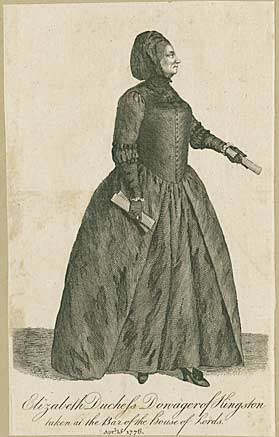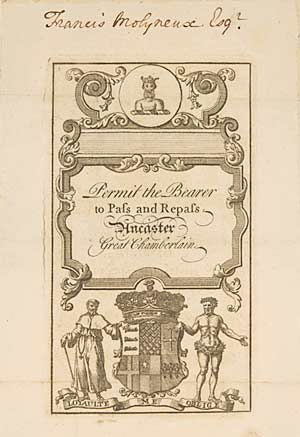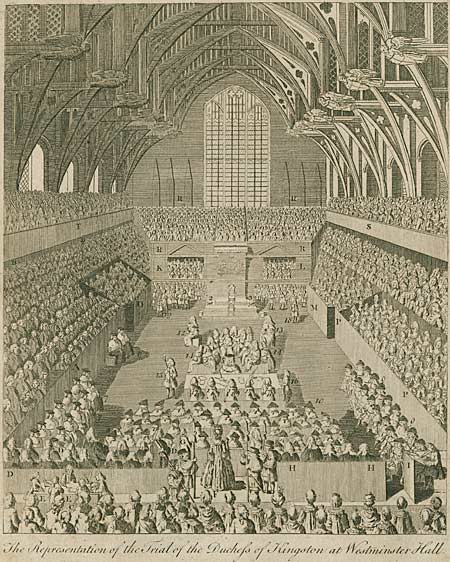The Bigamous Duchess of Kingston
Elizabeth Chudleigh (c.1720-1788) came from an impoverished landed Devon family. In 1744 she married a Royal Navy officer, Augustus John Hervey (1724-1779) but concealed the marriage so that she could retain her position as maid of honour to the Princess of Wales. The marriage failed and she became the mistress of Evelyn Pierrepont, 2nd Duke of Kingston-upon-Hull (1711-1773), of Thoresby and Holme Pierrepont in Nottinghamshire.
Meanwhile, Hervey became heir to the Earldom of Bristol. When the 2nd Earl of Bristol fell ill in 1759, Elizabeth forged an entry in the church register, hoping to support a later claim as Countess. However, marriage to the Duke of Kingston was a better prospect. As Hervey also wished to make another marriage, the pair colluded in 1769 to conceal evidence of their wedding. Elizabeth committed perjury in the ecclesiastical court and married the Duke within weeks.
In 1773 Kingston died. While she remained a widow, Elizabeth was entitled to his estate revenues and all of his personal effects. The Duke's will was disputed by his disinherited nephew Evelyn Medows, who brought the bigamy case against her.

Elizabeth, Duchess of Kingston at her trial at Westminster Hall, 1776 [Ma 2 X 2 (iii) f]

Ticket for the Duchess of Kingston's trial at Westminster Hall, 1776 [Mol 266]
The 1776 trial for bigamy of Elizabeth Pierrepont, Duchess of Kingston, gripped the nation. The account, An authentic detail of particulars relative to the late duchess of Kingston [East Midlands Spec. Coll. Not 346.V38], published after she died, tapped into public curiosity about her eventful life.
Describing the forging of her marriage entry, the author writes, "Here was cunning, despicable cunning, envelloping the possessor in a net of her own fabricating. No wonder, when her hour of degradation arrived, that she fell unpitied".
Tickets for the trial were keenly sought by members of the public. The ticket shown above, one of only 350 printed, belonged to Francis Molyneux Esq., later Sir Francis Molyneux 7th Baronet, of Teversal (d.1812).

Engraving of the trial of the Duchess of Kingston at Westminster Hall, 1776 [Ma 2 X 2 (iii) e]
The trial for bigamy took place over five days, 15th-22nd April 1776, in front of the House of Lords. After hearing the evidence, all 119 Lords took it in turn to declare their verdict. Each spoke the word 'Guilty'.
Elizabeth immediately fled to the Continent. She retained a substantial fortune left to her by the Duke of Kingston. During the last two years of her life she lived in Russia, in part at the court of Catherine the Great, and in France. She died suddenly on 26th August 1788.
Next: The Druce Case